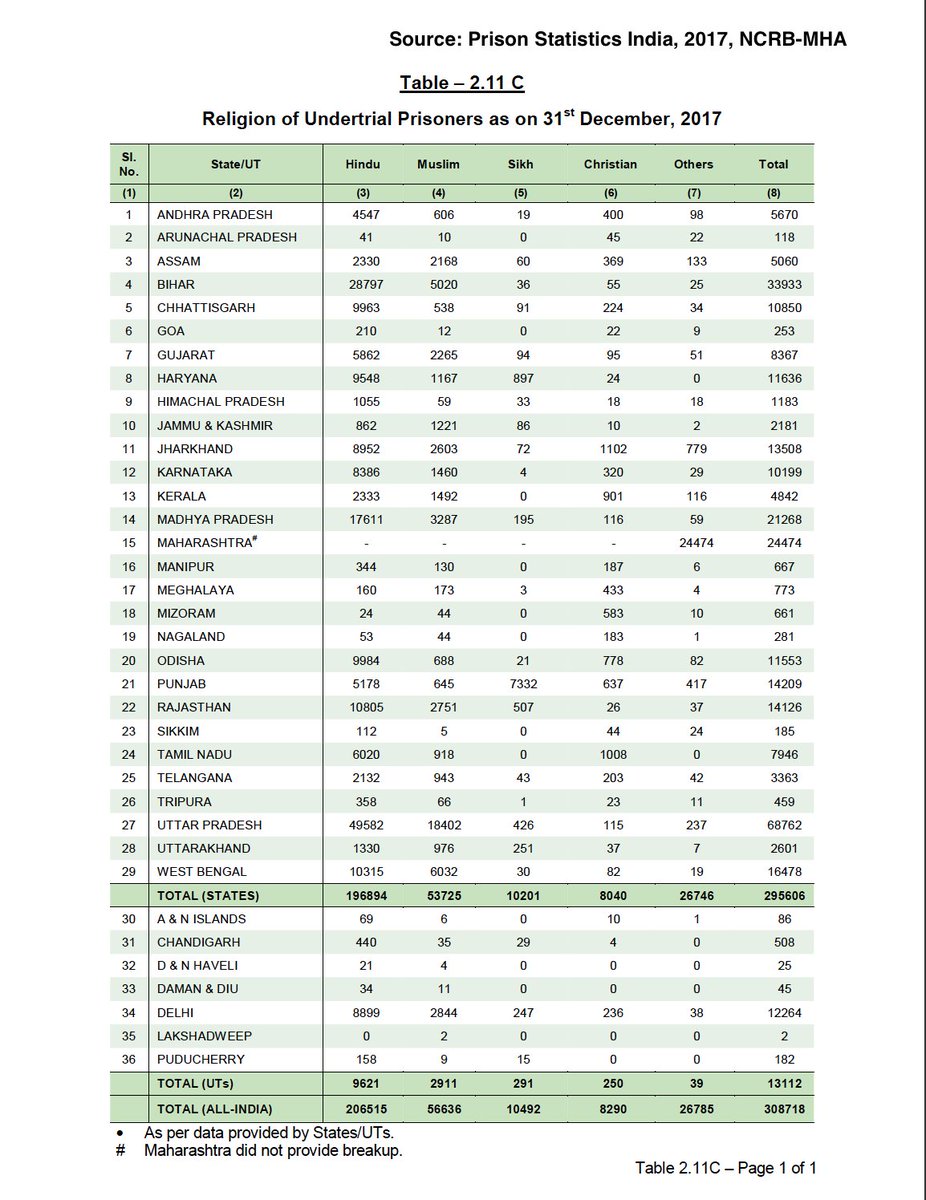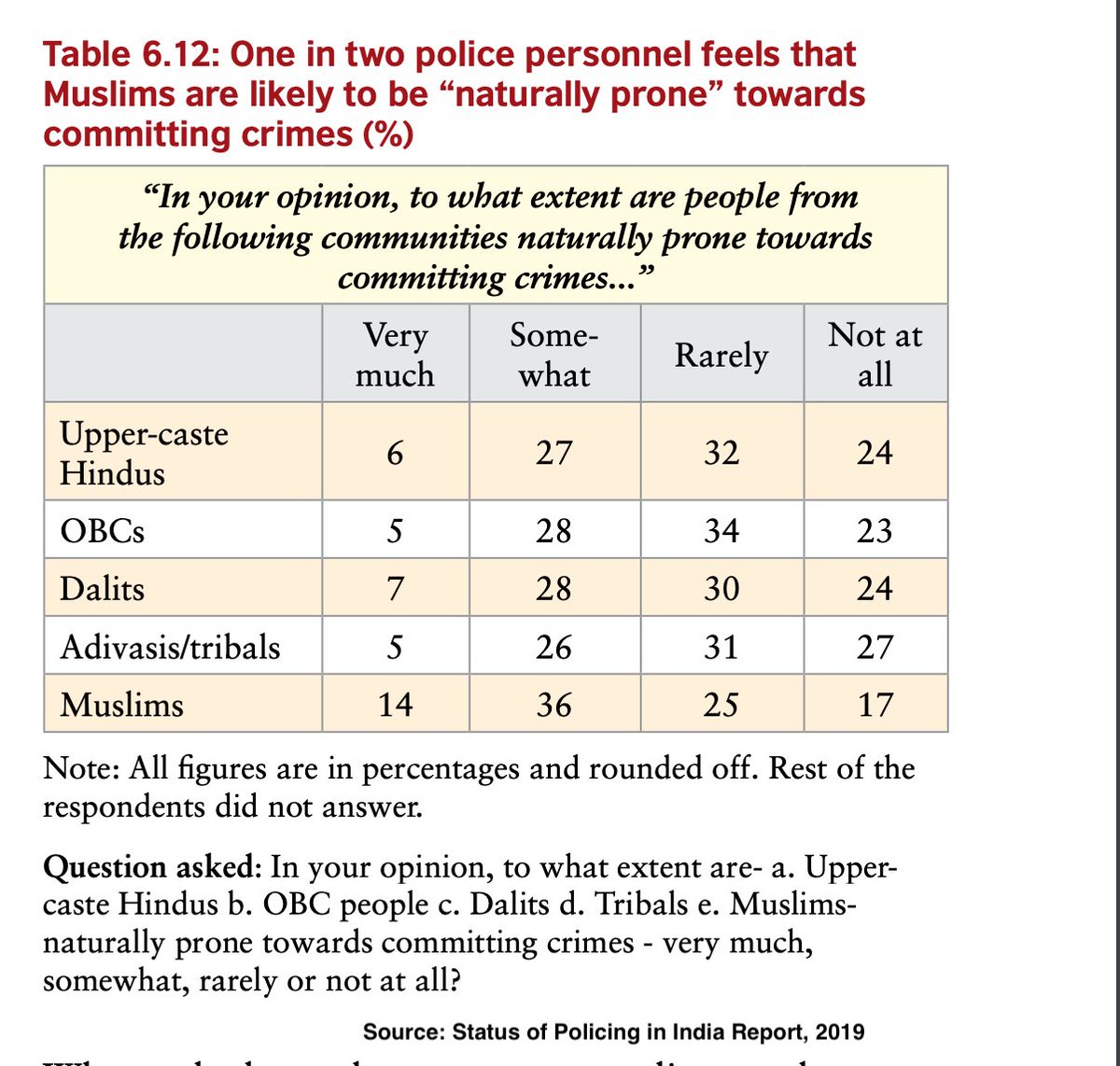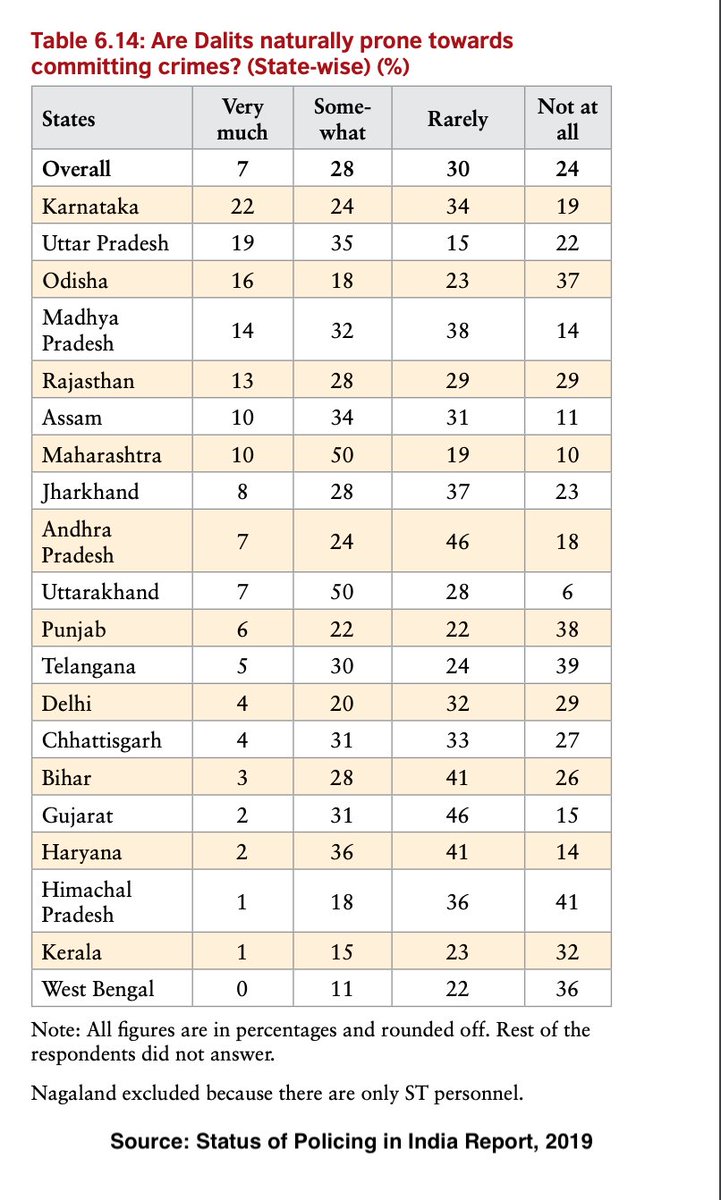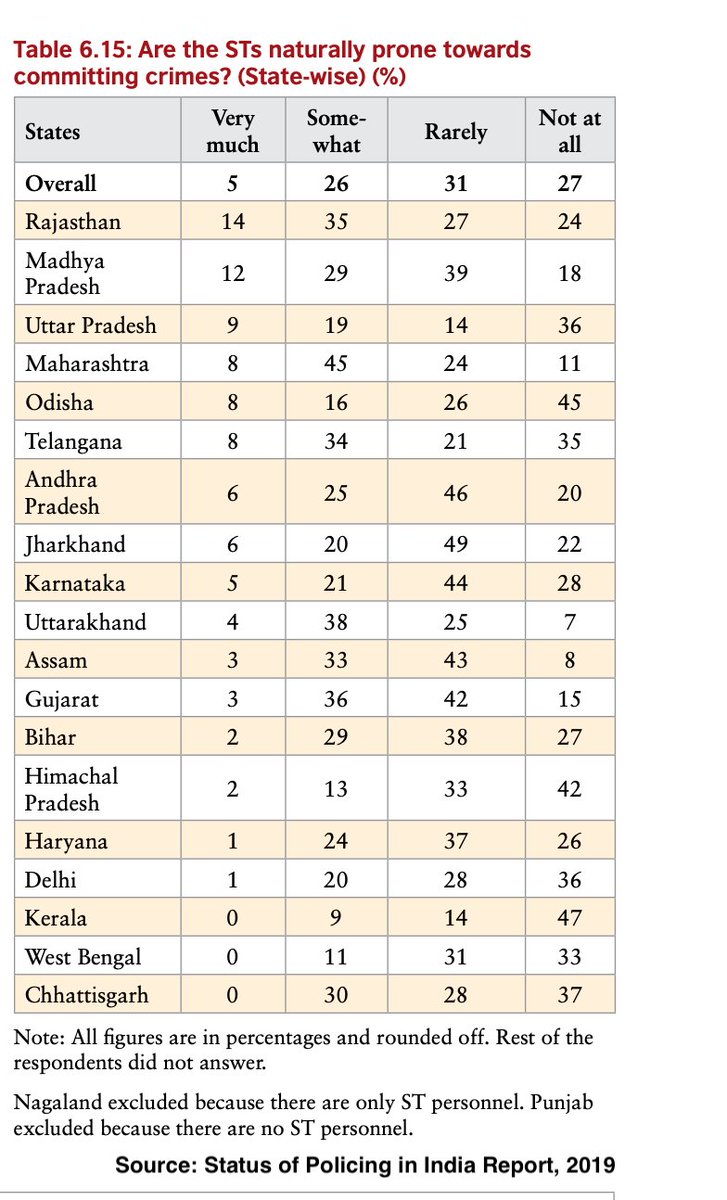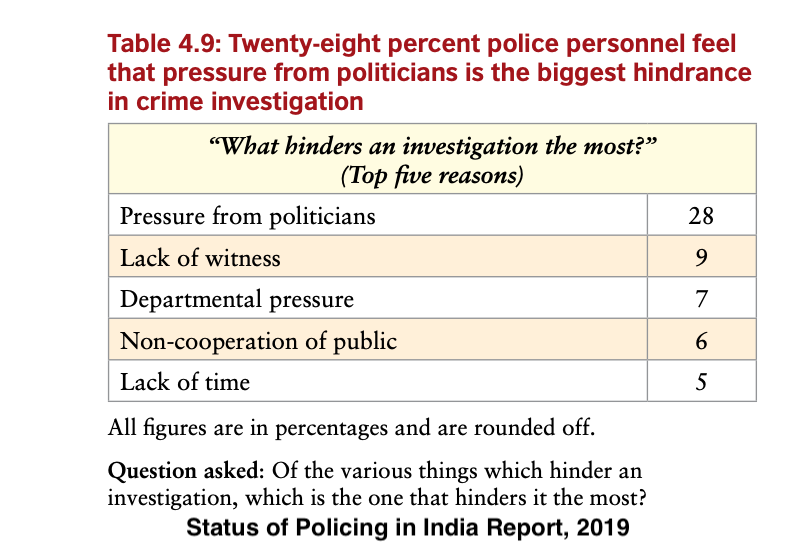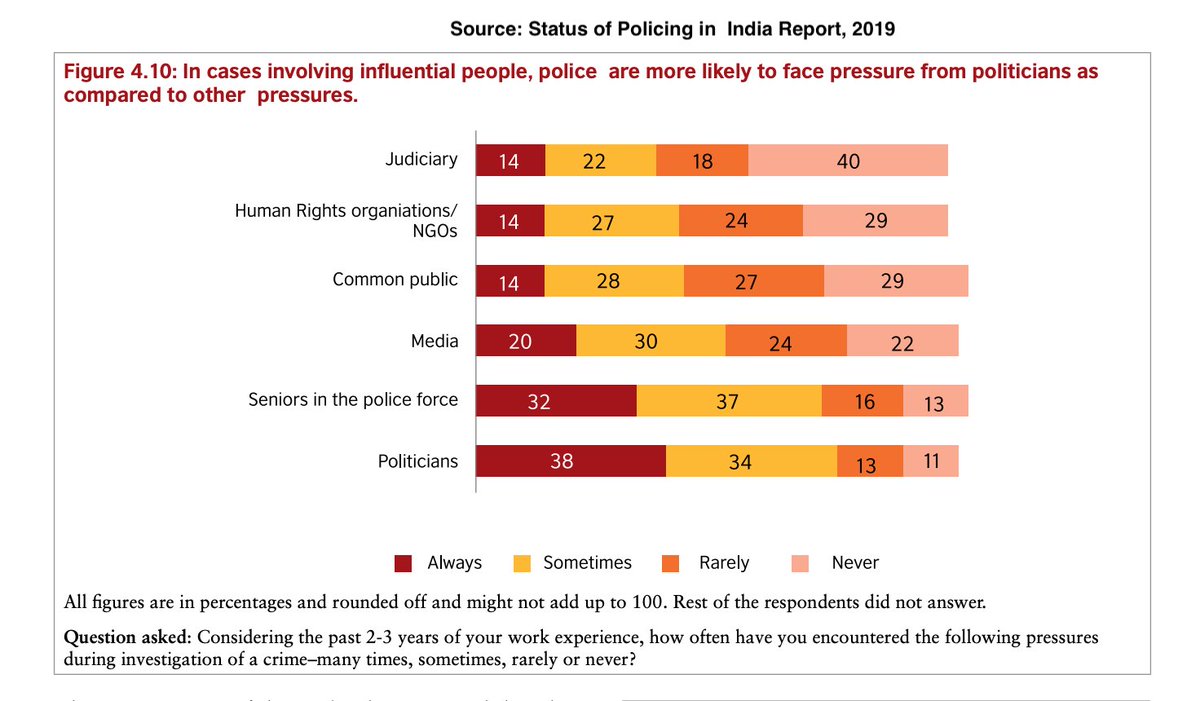Hello, we are @aimanjkhan & @GuneetKaurAhuja. Today, we will discuss how #UAPA gives wide powers to the government to facilitate prolonged incarceration of human rights defenders, & gives the police a multi-purpose tool to target innocent minorities. 1/n
As a 1st step, let's recap some of the wide discretionary powers that investigating agencies get, to decide who will be targeted by UAPA. It is totally at the whim of the government on which organization is banned & which is not. 2/n
At an all-state DGP’s conference, DGP’s of Maharashtra, MP & Rajasthan had made a strong plea for a concurrent ban on Bajrang Dal & SIMI as ‘internal terrorist organizations.’ However, only SIMI- a Muslim organization was banned under UAPA. See- https://www.sabrang.com/pota.pdf 3/n
Crimes in UAPA are covered by IPC. However, UAPA allows police to negate accused's rights whereas cognizance under IPC is supposed to follow Cr.P.C's procedural safeguards such as those on bail, police custody, etc. We will elaborate on this further on Monday. 4/n
The investigating agency & its political bosses have complete discretion to decide on which case to apply UAPA with its repressive trial process & where to simply apply IPC or other laws with all the procedural safeguards of Cr.P.C. 5/n
The vagueness of words like "intent to threaten or likely to threaten the unity, integrity, security or sovereignty of India...or likely to strike terror" as well as "by any other means" in the definition of a terrorist act. 6/n
This vagueness gives the police wide discretion to decide which non-violent political acts become "terrorist acts" and which violent political acts continue to be charged under IPC sections on rioting, incitement, etc. 7/n
There are various reports that Sambhaji Bhide & Milind Ekbote conspired to instigate violence at Bhima Koregaon, including SM posts attributed to Ekbote's organization that had violent language. However, UAPA was not involved in the FIRs against them. 8/n https://thewire.in/caste/a-reporter-saw-the-bhima-koregaon-violence-coming-now-he-fears-for-his-life
However, Marathi translation of Bertolt Brecht's poem, which was quoted in a speech during #BhimaKoregaon celebration was reason enough for the police to invoke charges for terrorist activity under UAPA implicating several rights defenders. 9/n https://www.barandbench.com/columns/brecht-speaks-ambedkar-bhima-koregaon
A vague definition of "terrorist act" also provides vide investigative discretion for other offenses that are listed in the chapter on terrorist activities such as conspiracy, raising funds, membership of a terrorist gang, harboring, holding proceeds, etc. 10/n
Further, each of these offenses is defined through broad, all-encompassing terms such as "advocates", "advises", "directly or indirectly, raises or provides funds or collects funds", "causes to be", "conspiring in acts preparatory to commission of a Terrorist Act", etc. 11/n
Similarly, "unlawful activity" includes any verbal/written/artistic act that -disclaims/questions/disrupts/is intended to disrupt sovereignty & territorial integrity of India or causes/ is intended to cause disaffection against India. To disclaim & question is to dissent. 12/n
Protests are supposed to be inconvenient. A citizen can only make a country better by being both critical & affectionate. To exercise fundamental freedoms, to do one's civic duty can be & is labeled as a crime by the police. 13/n
With UAPA, police have wide power to delegitimize certain Qs, selectively criminalize protests & target inconvenient critical citizens. Police’s wide discretion is influenced by 2 factors- caste & communal prejudices within police & goals of the government in power. 14/n
In 08/2018, 2 men publicly burnt the Constitution. In India where the constitution is supreme, an act like this presumably "causes or intends to cause disaffection against India". Now, this is a UAPA offense but the duo was not charged under UAPA. 15/n https://www.ndtv.com/delhi-news/two-arrested-for-burning-copy-of-constitution-in-delhi-1899394
On the other hand, is the case of five Muslim men who spent about 40 months in wrongful incarceration for organizing a public event on "‘Role of Muslims in Indian Freedom Struggle" on Independence Day in 2006. 16/n https://www.livelaw.in/news-updates/kerala-hc-acquits-all-5-convicted-by-nia-court-in-alleged-simi-camp-case-144376
In response to a Q raised by @ElamaramKareem_ on no. of #UAPA undertrial persons in jail for > 5 years, MoS-Home replied that govt. "does not analyze data of terrorism-related cases registered or persons arrested based on the religion.” 17/n https://www.thehindu.com/news/national/manipur-jk-record-maximum-number-of-cases-under-unlawful-activities-prevention-act/article30070028.ece
Yet again, for govt. the bogey of terrorism comes handy for avoiding transparency & accountability. However, overall policing related data & patterns in known UAPA cases show arbitrary usage to target minorities & marginalized groups just like its predecessors TADA&POTA. 18/n
53% of undertrials in Indian prisons are Dalit, Muslim & Adivasis, but they constitute 39% of India's population (State of Policing in India, 2019). Similarly, Sikhs are roughly 1.7% of the population but 3.3% of the undertrials (Prison Statistics India, NCRB-MHA-2017).19/n
As per @CommonCauseInd + @LoknitiCSDS Status of Policing in India Report-2019, 50% police personnel feel that Muslims are likely to be naturally prone towards committing violence & in Uttarakhand, Maharashtra, Jharkhand & Bihar, this prejudice was held by 2/3rd of police. 20/n
In Maharashtra, Uttarakhand & Uttar Pradesh, > 1/2 of the police hold the prejudice that Dalits are likely to be naturally prone towards committing violence. 21/n
https://www.commoncause.in/uploadimage/page/Status_of_Policing_in_India_Report_2019_by_Common_Cause_and_CSDS.pdf
https://www.commoncause.in/uploadimage/page/Status_of_Policing_in_India_Report_2019_by_Common_Cause_and_CSDS.pdf
About half of the police personnel surveyed in Rajasthan & Maharashtra & 2/5th of police in MP, Telangana, Gujarat & Uttarakhand hold the prejudice that Adivasis are likely to be naturally prone to committing crimes. 22/n
These figures show that policing processes in India are casteist & sectarian. It's no surprise then that people from minority & marginalized communities form a disproportionate number of undertrials in India's prisons. 23/n
With UAPA, India's police force with its deep prejudice against the most vulnerable communities is given wide power to decide who will be impacted by it. Add to this already dangerous combination, the pressure from the political party in power to serve their interest. 24/n
From exercising their wide discretionary powers on which organizations are banned, or whether UAPA is applied or just IPC, to the interpretation of vague terms like security, sovereignty, integrity, unity, disaffection, etc., ...(cont.) 25/n
...UAPA implementation is rife with a casteist & sectarian policing approach & political party in power's interest to silence certain human rights defenders &/or neutralize various people's movements. 26/n
As the govt. allows commercial coal mining at the cost of rights of Gram Sabhas in Adivasi areas, Grab Sabha activist Mahesh Raut's continued incarceration for last 2 years means the absence of a strong voice against such repressive measures. 27/n
We see how UAPA's repressive net became wider & more despotic in the last 6-7 years as power shifted from governments with a majoritarian instinct to those with a fascist tilt. 28/n
While parties in power have always favored a centralized majoritarian idea of India. Now it is a "Hindutva" conception of India with RSS + BJP's absolute political power that views sovereignty, integrity, unity, security of India from a "Hindutva" lens. 29/n.
Thank you for joining us today. Please ask questions, give feedback, and add if we've missed anything. Our next thread on the dilution of procedural safeguards in UAPA, that facilitates prolonged incarceration will be posted on Monday. 30/30 #RepealUAPA #StandWithMahesh

 Read on Twitter
Read on Twitter